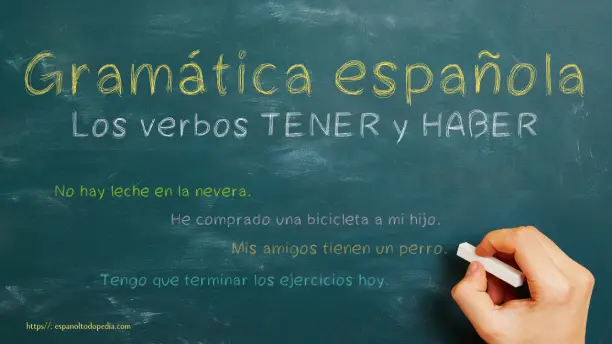Today, we are going to clarify one of the most common doubts when learning Spanish: when do we use the verbs TENER and HABER? Although they may sometimes seem similar, they can actually be translated as «to have», but they have very different functions and are used in other contexts.
In the video below, you will see clear examples and simple tricks to help you avoid confusion. So, when we finish, you’ll be ready for the exercises and feel much more confident using HABER and TENER. Let’s begin!
I hope you found the video helpful. Now it’s time to test what you’ve learned about TENER and HABER.
TENER and HABER: Why is this lesson important?

Mastering these two verbs is key to speaking and writing Spanish correctly. If we misuse them, we risk confusing the person listening to us or altering the intended meaning of our message. Think of them as two tools with particular uses. However, you also need to learn about VOSOTROS (you plural and formal).
And there is more to consider about TENER and HABER:
- Haber is used mainly as an auxiliary verb, that is, it helps to form compound verb tenses, as in «we have eaten» (hemos comido). We also use it to express the existence of something, as in «there is an apple on the table» (hay una manzana en la mesa).
Don’t forget the impersonal form of the verb HABER «HAY«, which is equivalent to there is or there are:
-
-
- Hay unos gatos en mi jardín. ➡️ There are some cats in my garden.
- ¿Hay una farmacia cerca de aquí? ➡️ Is there a pharmacy near here?
-
- Tener is used to express possession, as in «I have a book» (tengo un libro), or to talk about obligations, as in «I have to study» (tengo que estudiar).
💡But be careful, in Spanish we use the verb TENER, while in English we use verbs like to be or to feel.
-
-
- Tener hambre ➡️ To be hungry
- Tengo hambre. ➡️ I’m hungry.
- Tener sed ➡️ To be thirsty
- ¿Tienes sed? ➡️ Are you thirsty?
- Tener frío/calor ➡️ To be cold/hot
- Tengo frío. ➡️ I’m cold.
- Tener sueño ➡️ To be sleepy
- Tengo sueño, me voy a la cama. ➡️ I’m sleepy, I’m going to bed.
- Tener miedo ➡️ To be afraid/scared
- El perro tiene miedo a los truenos. ➡️ The dog is afraid of thunder.
- Tener vergüenza ➡️ To be ashamed/shy
- Tenía vergüenza de hablar en público. ➡️ She was ashamed to speak in public.
- Tener prisa ➡️ To be in a hurry
- No puedo hablar, tengo prisa. ➡️ I can’t talk, I’m in a hurry.
- Tener suerte ➡️ To be lucky
- ¡Qué suerte tienes! ➡️ You’re so lucky!
- Tener hambre ➡️ To be hungry
-
In Spanish, we also use tener to talk about age.
-
-
- Tener… años ➡️ To be… years old
- Tengo 30 años. ➡️ I am 30 years old.
- ¿Cuántos años tiene tu hermano? ➡️ How old is your brother?
- Tener… años ➡️ To be… years old
-
The Use of «Vosotros» in Spain
In most of Spain, the pronoun vosotros (and its feminine form, vosotras) is used to address a group of people informally. It is the equivalent of «ustedes» in many Latin American countries.
To conjugate verbs with «vosotros», the ending -áis is used for verbs ending in -ar (habláis), -éis for verbs ending in -er (coméis), or -ís for verbs ending in -ir (vivís):
-
-
- Tenéis que darnos las llaves al final de la clase. (You all have to give us the keys at the end of the class.)
- Habéis hecho un trabajo excelente. (You all have done an excellent job.)
-
It’s important to remember that in Latin American Spanish, these same sentences would use ustedes and the verb would be conjugated differently, for example: Tienen que darnos las llaves al final de la clase or Han hecho un trabajo excelente. Learn more about Spanish Subject pronouns.
Click on the link to see the whole conjugation of verbs HABER and TENER.
